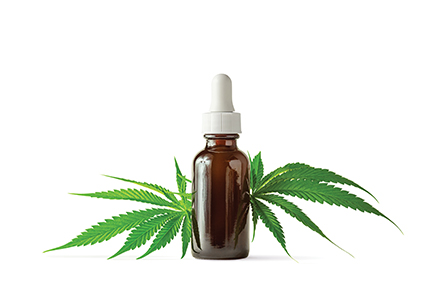The societal opinion of marijuana has evolved in recent years. There are currently 11 states that have approved recreational use of marijuana for those over 21, and medicinal usage has been approved in 33 states.
Despite this, the cannabis plant’s designation as a federally illegal substance under the Controlled Substance Act remains unchanged. These recent developments in cannabis decriminalization have given rise to the popularity of a different product — cannabidiol or, as it is commonly known, CBD.
The emergence of interest in these technically legal products provides a new concern for the trucking industry. Can professional truck drivers use these products without fear of testing positive for Tetrahydrocannabinol, commonly known as THC, on a DOT-mandated drug test? The short answer is that without oversight from federal agencies, there are no guarantees when it comes to CBD products.
“I cannot emphasize enough that there is no room for drugs in our industry,” said Truckload Carriers Association Vice President of Government Affairs David Heller. “They are a danger to everyone on the roadway … a danger to those with whom we share the road and a danger to our drivers. Drugs are not safe for anyone, and we have to acknowledge the fact that we must do everything we can to combat the problem.”
So you may be wondering: What exactly is CBD? Simply put, CBD is another part of the cannabis plant, aside from THC. While THC is the active “intoxicating” ingredient in the plant, CBD is a “nonintoxicating” portion of the plant’s chemical makeup.
According to the Federal Drug Administration, the 2018 Farm Bill removed hemp, which is defined as cannabis and cannabis derivatives with very low concentrations (no more than 0.3% on a dry weight basis) of THC, from the definition of marijuana in the Controlled Substances Act which makes the sale of CBD products technically legal. However, there is currently no FDA oversight of the products.
Jason S. Lupoi, who has a Ph.D. in analytical chemistry and has authored a book titled The Cannabis Terpene Experience, said that in order to determine the THC percentage of a CBD product, manufacturers typically send a sample to a third-party lab for testing.
“The lab runs the test using a technique called chromatography, which just separates out the individual chemical ingredients in the sample,” said Lupoi. “The signal generated from the sample is then used to quantify the chemical concentration of each cannabinoid (a.k.a. potency).”
Lupoi said the FDA has issued warnings to some CBD companies regarding the medical claims that are made on their packaging, while some states, such as Florida, have begun drafting their own regulations for these products. Other states, such as New York, have specified that since scientifically cannabis and hemp are the same plant (Cannabis Sativa), state regulations for cannabis and hemp should be applied to CBD products.
The analytical report is not only important in determining the amount of THC, but it can also provide insight into the legitimacy of an item as a CBD product in general, as well as indicate if any pesticides are found.
“Some CBD products have been detected as having zero CBD, which means that the consumer is throwing away hard-earned cash on hemp-seed oil or something that contains no cannabinoids,” added Lupoi. “The other marketing term to be weary of is THC-free, since this can imply that there is absolutely no THC in a product. Anyone subjected to drug tests should be concerned, as there could be traces of THC; perhaps the lab didn’t detect THC with their analytical methods.”
Lupoi said that ultimately THC content dictates whether a plant is called hemp or cannabis, but that determination polarizes a plant into two “different corners of the ring, based off one molecule.”
Lupoi stated that if one chose to use CBD products, selecting a trustworthy brand is important, along with being educated about the certificate of analysis that indicates the contents of the product.
“Quality CBD products do exist,” he said. “Companies that have cultivated organically grown hemp and have processed in cGMP (Current Good Manufacturing Practices) and USDA organic-certified facilities are a useful starting place. Be very wary of CBD products sold on forums, or in strip malls, gas stations, etc. When purchasing any CBD product, look for reputable brands that include certificates of analysis.”
CBD is currently marketed in a variety of product types, such as oil drops, capsules, syrups, food products, topical lotions, and creams. CBD products are still subject to the same laws and requirements as FDA-regulated products that contain any other substance.
To date, the FDA has only approved one prescription CBD product, which is used to treat rare, severe forms of epilepsy. There is very limited information for other marketed CBD products, which likely differ in composition from the FDA-approved product and have not been evaluated for potential adverse effects on the body, according to the organization’s website.
“The recent marijuana-legalization efforts have uniquely challenged [the trucking] industry and have led to critical issues of workplace and highway safety,” said American Trucking Associations President and CEO Chris Spear, while testifying before the U.S. Senate Subcommittee on Transportation and Safety Committee on Commerce, Science and Transportation. “Since 1991, DOT has required mandatory alcohol and controlled-substance drug testing for employees in safety-sensitive positions in all transportation modes.”
The lack of monitoring of the sale of these products by the FDA is a primary consideration that Urgent Care Travel Clinic Director and Health Coach Lynn Brandt said should be taken into consideration for any driver considering the use of CBD in any form.
“CBD oil is not regulated by the FDA, and therefore there is no oversight on what is contained within the oil, gummies, lollipops, crunchies, vape, etc.,” said Brandt. “The concentration amount varies between lack of regulation, higher dose concentrations and taking more than the recommended dose. For those reasons, drivers should be cautioned that a drug screen could in fact turn up positive for THC.”
Brandt reiterated that currently the FDA considers any percentage lower than 0.3% THC to be legal, but with no guidance and oversight at the federal level, there’s no guarantee that the products being sold are below that level. She added that regardless of each state’s view and legality of marijuana, the DOT drug-testing guidelines will always supersede any state regulations regarding the sale and use of any products related to or derived from the cannabis plant.
Brandt said she often sees drivers at her clinic, located inside a Pilot Flying J in Cartersville, Georgia, who are seeking CBD products for pain relief, anxiety relief, and depression. In addition, some drivers look to CBD in place of marijuana because they perceive it to be legal.
“I often hear drivers say, ‘Well I live in a state where marijuana is legal, and since CBD is legal everywhere my company cannot legally use what they find on a drug screen,’” shared Brandt. “I try to make sure they understand that the DOT regulations supersede the law of their state. In addition, the company they drive for can enact a no-tolerance policy to any substances including CBD oil.”
Brandt said that if CBD remains unapproved and has not been thoroughly tested by the FDA, she cannot recommend the use of any CBD products to anyone.
“The safest rule for themselves and for all drivers, both professional and regular citizens, is to avoid using CBD products,” she reiterated. “As a DOT examiner I cannot recommend any CBD products be used.”
Wendy Miller holds a bachelor’s degree in journalism and a master’s degree in strategic communications. Wendy has been a journalist and editor for nearly 15 years and has specialized in niche publications for the past eight years. Wendy draws her love for the trucking industry from growing up as a trucker’s daughter.











